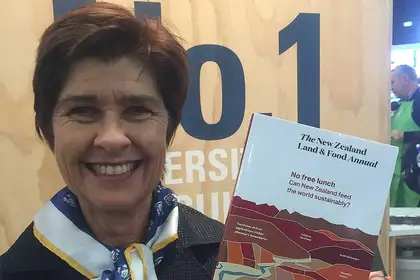
Professor Claire Massey.
The second edition of The New Zealand Land and Food Annual was launched today at the National Field Days in Mystery Creek.
The book, published by Massey University Press, gathers the thoughts and opinions of 31 expert contributors as to how New Zealand can tackle the issues and lead the way in the world’s green revolution.
Massey University Director of AgriFood Professor Claire Massey edited the book and says the sustainable production of food is a constant goal.
“There is no free lunch – no matter what food is grown and how it is processed and transported to the consumer, there is an impact on the planet. This impact creates consequences for individuals, societies and communities, and although this is not a difficult idea to grasp, it is harder to quantify the scale of the impact. It is harder still to decide what to do about it and how to make the best choices as individuals, within communities and for a country.
“But it is one which we all have a responsibility to grapple with to the best of our ability, for the sake of our grandchildren and those who follow them,” says Professor Massey.
The land and food sector is currently worth $33 billion to the New Zealand economy, and with the intention to treble that value by 2025, we need to ensure that sector is one of nutrition-driven agriculture that operates within planetary boundaries.
As contributor Professor Ralph Sims says, “The current debate over the environmental impacts resulting from intensifying agri-food systems clearly shows that our present farming and food-processing practices are not sustainable. As energy-smart, resource-smart and climate-smart agri-food practices evolve around the world...there are lessons to be learned for New Zealand. Presently we are not leading by example — but we could."
To make your order, click here.
Chapters of note
- Professor Barbara Burlingame on putting sustainable diets at the forefront of the debate; that way, both health and the environment are nurtured.
- Dr Mike Joy, of the Institute of Agriculture and Environment, on our deadly nitrogen addiction and the impact on our waterways.
- Associate Professor Jason Wargent, of the Institute of Agriculture and Environment, on the potential for vertical farms to provide products that complement those grown in more traditional ways.
- Kerensa Johnston and Rachel Taulelei on the Kono NZ story, and how the values of manākitanga (the quality of care and generosity towards people) and kaitiakitanga (the need to ensure that between people and the land, or the land and the sea, is maintained) have influenced their business.